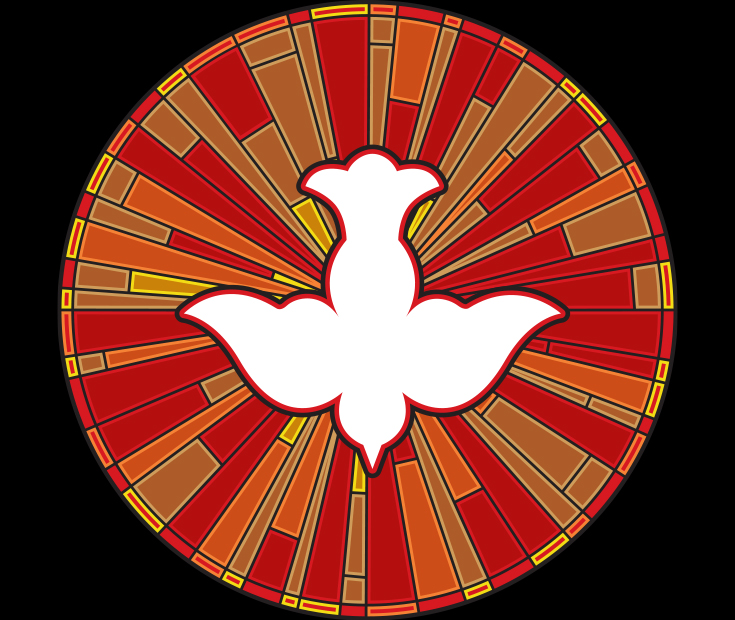The 12 Days of Christmas
An Act of Love
Download Devotional Bahasa Indonesia Mandarin Chinese (普通話)
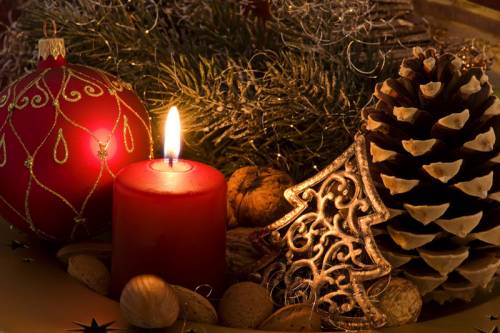 Embracing Christmastide
Embracing Christmastide
December 25 is here, and our devotional continues as we enter the joyous season of Christmas. These 12 days, which bring us to Epiphany on Jan. 6, seem to go unnoticed by the rest of the world, as festive decorations are taken down all too quickly.
I encourage you, though, to observe Christmastide. Keep the decorations up. Take the middle candle in the Advent wreath, the Christ candle, and put it in a prominent place in your home and light it on each of these 12 days as a reminder of the Christ light shining in the world. And, of course, we will continue to bake our bread to share with others. But most of all, use this time to ponder what God’s gift of Jesus, the Christ, has meant — and will mean — in your life.
Howard Thurman viewed the Christmas season as a time for taking stock and making adjustments in our lives — and that is what we will do. We will take stock and make the necessary adjustments so that our lives will more clearly reflect the worous gift we have received.
Each day in Christmastide will feature a reflection followed by the same questions, inviting you to examine what needs to be done to truly “adjust” your life. The questions are short, but they are not simple: How can my life better reflect the light of Christ? What do I need to let go of? What do I need to do more of?
Blessings,
Donna Frischknecht Jackson
The Sacrament of Christmas
By Howard Thurman
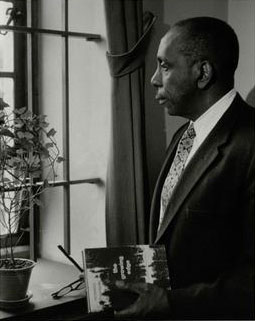
Howard Thurman From the Howard Thurman and Sue Bailey Thurman Collections, Howard Gotlieb Archival Research Center at Boston University
I make an act of faith toward all humankind,
Where doubts would linger and suspicions brood.
I make an act of joy toward all sad hearts,
Where laughter pales and tears abound.
I make an act of strength toward feeble things,
Where life grows dim and death draws near.
I make an act of trust toward all life,
Where fears preside and distrusts keep watch.
I make an act of love toward friend and foe,
Where trust is weak and hate burns bright.
I make a deed to God of all my days —
And look out on life with quiet eyes.
Reflect
For Howard Thurman, Christmas was a time for the “forgiveness for injuries past,” for the “remembrances of graces forgotten,” and for the “sense of renewal restoring the soul.” Where do you need to extend forgiveness? What graces are worth remembering? In what ways will you renew and restore your soul?
Pray
God of grace, help us to fully enter this season of Christmas rather than rushing to pack it away. May we slow our steps and linger at the manger, lifting always our praises to you for the life-giving gift of Jesus. In his name, we pray. Amen.
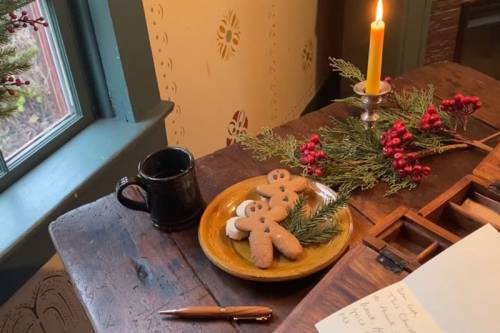 Day 1| Saturday, Christmas Day, Dec. 25
Day 1| Saturday, Christmas Day, Dec. 25
A longing for home
For the grace of God has appeared, bringing salvation to all, training us to renounce impiety and worldly passions, and in the present age to live lives that are self-controlled, upright, and godly, while we wait for the blessed hope and the manifestation of the glory of our great God and Savior, Jesus Christ. He it is who gave himself for us that he might redeem us from all iniquity and purify for himself a people of his own who are zealous for good deeds. — Titus 2:11–14
I once attended a Christmas tea at the local library where, gathered around tables sipping fragrant teas and sampling homemade holiday goodies, we were asked to share memories of Christmases past. Some memories were funny; some were sad. After everyone had shared, a moment of silence descended upon the room. It wasn’t planned. It just happened while we either chuckled to ourselves or wiped away a tear as we each longed for a home that was no more.
There is an old Welsh word for that longing of home. It’s called “hiraeth.” While it can be loosely translated as “nostalgia,” it is more than that. It’s a deep longing — an ache almost — in one’s heart not for a specific place, but more for the love that resided there. As I get older, I understand better the concept of hiraeth.
I find myself up before the sun rises on Christmas Day, quietly plugging in the tree lights and making coffee. I then take out the German stollen — a dried fruit and marzipan Christmas bread that was my family’s tradition every Christmas morning — and I cut into it. As I do, the longing in my heart grows as I remember my brother and sister running down the stairs to get to the presents under the tree; the bayberry candle that my mother lit by the manger scene, shining light on the baby Jesus figurine; and the crackling of the yule logs that looped continuously on the TV screen. I remember mom and dad, their younger versions, smiling from the couch as their children squealed with joy at the gifts Santa had left them. I remember, and I ache for that to which I cannot return.
We all long for home, whatever that vision of home might be. Yet the Christ Child reminds us that while we cannot go back, there is still more joy to come. The love we ache for is right there in the face of Jesus.
I wipe away a tear over what once was and sip my coffee. The lights on the tree shine brilliantly. I bite into the stollen. Today the weary world has been given the most perfect gift: Jesus. And he is all I need.
“Christmas is the brooding presence of the eternal Spirit making tired hearts refreshed and dead hopes stir with newness of life,” said Howard Thurman. “Christmas is the promise of tomorrow at the close of every day.”
Pray
God, on this Christmas Day, may you take the longings and aches of our hearts and transform them into something beautiful. May peace and joy fill our homes. In Jesus’ name, we pray. Amen.
Taking stock
How can my life better reflect the light of Christ? What do I need to let go of? What do I need to do more of?
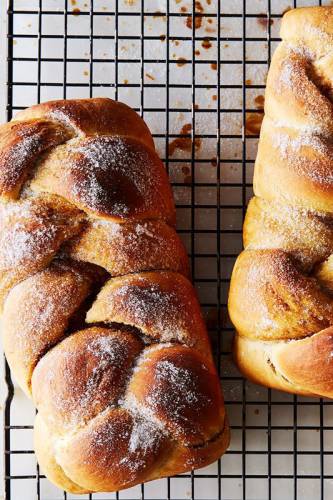 Grandma Allen’s Cardamom Coffee Bread
Grandma Allen’s Cardamom Coffee Bread
This recipe was submitted by Anne Turek, a Presbyterian in upstate New York, who says every Christmas this bread brings back memories of “home.” The recipe makes two loaves — so think about who to gift the second loaf to.
- Mix 2 teaspoons of yeast and 1 teaspoon of sugar in ¼ cup of warm water. The yeast should bubble and foam up.
- Melt 1 stick of butter in 2 cups of milk. Don’t let it boil.
- Put the melted butter and milk in a bowl with 1 egg, ½ cup of maple syrup and one teaspoon of salt. Let it cool to touch, and then add the yeast mixture.
- Add 6–7 cups of white bread or all-purpose flour. Add 1 teaspoon to 1 tablespoon of cardamom to the dough. Let it rise for 1 to 2 hours.
- Roll out the dough into a rectangle approximately 9 inches wide and 12 to 14 inches long. Butter the top. Spread the sugar/spice mixture — ½ cup of brown sugar, 2 to 3 teaspoons of cardamom and 1 to 2 teaspoons of cinnamon — over the dough.
- Roll the dough into a 9-inch log and place it in a well buttered bread pan. Snip across the loaf and “weave”
- Let the log rise again, and then bake it in a 350 degree oven till nicely browned.
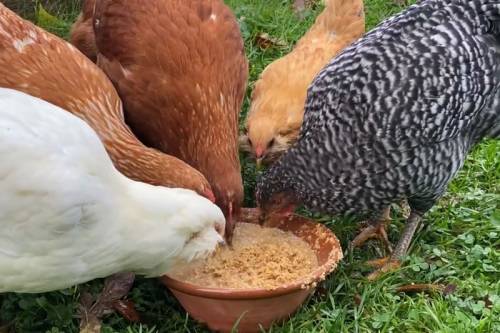 Day 2 | Sunday, Dec. 26
Day 2 | Sunday, Dec. 26
Bowls of warm porridge
Now there was a man in Jerusalem whose name was Simeon; this man was righteous and devout, looking forward to the consolation of Israel, and the Holy Spirit rested on him. It had been revealed to him by the Holy Spirit that he would not see death before he had seen the Lord’s Messiah. Guided by the Spirit, Simeon came into the temple; and when the parents brought in the child Jesus, to do for him what was customary under the law, Simeon took him in his arms and praised God, saying, “Master, now you are dismissing your servant in peace,
according to your word; for my eyes have seen your salvation, which you have prepared in the presence of all peoples, a light for revelation to the Gentiles and for glory to your people Israel.” … There was also a prophet, Anna the daughter of Phanuel, of the tribe of Asher. She was of a great age, having lived with her husband seven years after her marriage, then as a widow to the age of eighty-four. She never left the temple but worshiped there with fasting and prayer night and day. At that moment she came, and began to praise God and to speak about the child to all who were looking for the redemption of Jerusalem. — Luke 2:25–32; 36–38
Raising chickens in Vermont is not idyllic when winter snow piles up. The deep drifts make it a workout getting to the coop. On the coop itself hangs a lantern, often lit with a real candle that beckons me in the dusky dawn.
I keep my feathered friends snug with a thick layer of straw beneath their feet. I also treat them to warm porridge. Before making my first mug of steaming coffee, I tend to them, getting the water warmed as I trudge to the shed to scoop out their mash. I then stir the water and mash together and place the mixture in two bowls so that the chickens have enough room to leisurely enjoy their meal without nudging each other away. (It has happened.) My husband watches my morning routine, teasing me that “they are just chickens.”
I know they are more than that. They are little angels who pulled me up from a COVID-19 gloom that was descending upon me. They gave me a reason to get up early in the morning and spend my time doing something constructive, rather than mindlessly scrolling through social media at the breakfast table, ultimately being dragged down by all the negative news and comments.
It is said that the best way to feel better if you’re in a funk is to do something for someone else. Call a lonely neighbor. Visit a friend who has just lost a spouse. Make an extra loaf of bread for a relative you haven’t seen in a while. Show up for someone else. Put someone’s needs first, over yours. Iris Murdoch, a philosopher and novelist, called this “unselfing” — the process of stepping outside of self.
Christmastide is the perfect time to master unselfing. It’s also the time in the Christmas narrative that we hear from Simeon and Anna: two elderly people who held on to the promise that they would see salvation in the eyes of a baby. They waited in faith, knowing God would answer them. But as they waited, I wonder: Who was there caring for them? Who was being a friend to them? Who took time to listen to the wisdom they had? There are many in our lives right now we could be caring for, befriending and reaching out to, if only we learned to “unself.”
Winter can be a challenging time, not just for raising chickens. But when the days are dreary, I remember that there are bowls of warm porridge to make.
Pray
God who hears our cries and always answers us, we draw close to you today. You are always so good in providing for us, and we thank you for that provision. Help us this day to share that gift of care with others who might be blessed by the warmth of being seen, heard and loved. In Jesus’ name, we pray. Amen.
Taking stock
How can my life better reflect the light of Christ? What do I need to let go of? What do I need to do more of?
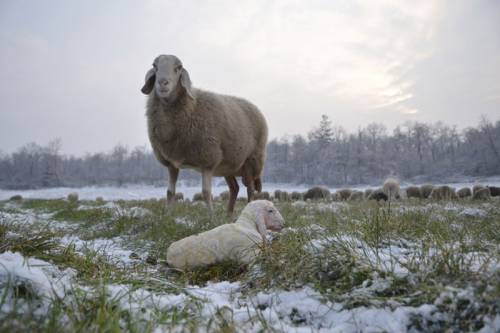 Day 3 | Monday, Dec. 27
Day 3 | Monday, Dec. 27
Giving our best to God
Do everything for the glory of God. — 1 Corinthians 10:31b
For years, I was the queen of children’s sermons. Or so my mother would tell you. She loved my mini-messages I would give at the Baptist church where I was working as the director of Christian education. I had just left my career as a trade magazine editor and was discerning the strange and wondrous call into ministry. I had no experience with children. I didn’t have any of my own, and I think I might have been the only teenager never to babysit. God, though, has a sense of humor, for there I was surrounded weekly by children.
My first Christmas at the church, I remember talking to the children about the gifts they wanted Santa to leave them. I talked about the real reason we have Christmas: that God loved them so much, God gave them the gift of Jesus. I then asked what we could give to God to show our thanks.
The answers were many — and funny. One little boy wanted to give God his new baby sister that he really didn’t want, but “mom brought her home anyway.” There were a few older children who talked about the Magi’s “really cool” and “expensive” gifts. I had an oversized stuffed lamb by my side, which I cradled in my arms as I shared with the children that the best gift wasn’t “cool” or “expensive.” It wasn’t something that could be bought. And it certainly wasn’t one’s baby sister! The best gift we could give God was one that came from the heart. “The little shepherd loved his lamb, but he was willing to give it to Jesus,” I said. The children were wide-eyed as they thought about what they might be able to give from their hearts.
While it was one of my mother’s favorite children’s sermons, I think it resonated with others over the age of five as well. I think back on it often, whenever I wonder if I am giving God my best.
Perhaps this Christmastide is our time to take stock of our lives and decide how to live differently, that is, to live in way in which our gifts are used to glorify God. Can we really give away that which is the most precious: our talents, our time and our treasures?
In every Buddhist monastery, there is a “tenzo,” the monk who oversees feeding the group. And the tenzo does it with great care, making sure each ingredient is the best, even if it is just a sprig of parsley for a humble soup or common flour for a batch of plain biscuits. What if we did everything with such care and love, thinking always of each act as a way to glorify God?
Pray
Loving God, in the gift of Jesus, you gave all of humanity a second chance to change: to be kinder, more generous and more loving. May all the tasks we do today, reflect that second chance to change. May all that we do and say be done in ways that glorify your holy name. In Jesus’ name, we pray. Amen.
Taking stock
How can my life better reflect the light of Christ? What do I need to let go of? What do I need to do more of?
 Day 4 | Tuesday, Dec. 28
Day 4 | Tuesday, Dec. 28
I shall not live in vain
Happy are those whose help is the God of Jacob, whose hope is in the Lord their God, who made heaven and earth, the sea, and all that is in them; who keeps faith forever; who executes justice for the oppressed; who gives food to the hungry. The Lord sets the prisoners free; the Lord opens the eyes of the blind. The Lord lifts up those who are bowed down; the Lord loves the righteous. The Lord watches over the strangers; he upholds the orphan and the widow, but the way of the wicked he brings to ruin. The Lord will reign forever, your God, O Zion, for all generations. Praise the Lord! — Psalm 146:5–10
I discovered the tattered book of Emily Dickinson’s poetry on a shelf of old cookbooks in the 18th-century tavern I was staying in as I learned how to cook over an open hearth. I have always enjoyed her poetry, so I took it gently in my hands and, by the light of the candle, began reading.
The prologue from the editor revealed some interesting facts about the poet that I never knew. Emily Dickinson was not just a wordsmith, she was an accomplished baker as well, tackling a new skill in the kitchen with grace and humor. In 1845 she wrote to a friend that she was going “to learn to make bread tomorrow.”
“So, you may imagine me with my sleeves rolled up, mixing flour, milk, saleratus [a leavening agent], with a great deal of grace,” she wrote, adding, “I advise you if you don’t know how to make the staff of life to learn with dispatch.”
Sound advice that a nonprofit in the United Kingdom has embraced. Called the “Real Bread Campaign,” the group advocates for healthy, sustainable living where the making of bread is the central focus. One of the many programs it has created is called “Together We Rise” where baking bread is brought into prisons and group homes to teach employable skills.
A few years ago, the Real Bread Campaign launched another program to help those struggling emotionally. Called “Bethlem Baking Buddies,” the six, two-hour baking sessions were held for residents in a mental health care facility at Bethlem Royal Hospital in Kent. The bread making was to help show how people could benefit therapeutically and socially from coming together to knead and bake bread.
I have always found baking bread to be therapeutic. There is something about the feel of the dough between your fingers and the work it takes to knead it. There is also a powerful lesson in having patience as you wait for the dough to rise, or in my case, wait to see “if” the dough will rise. I have always thought, too, about writing a cookbook for those with learning disabilities like my brother, one that would consider various motor skills and present instructions in an easy-to-follow format. How can we build a community where all abilities are represented?
The light from the candle was sputtering as it came to the end of its wick, but there was just enough for me to savor one last line in the book: “If I can stop one heart from breaking, I shall not live in vain.” The candle died out. I closed the book and sat in the now darkened room, wondering if Emily Dickinson had composed that beautiful line while kneading her bread.
In this season of Christmastide, what ways can you stop one heart from breaking?
Pray
God, you call us to live peaceably with one another, yet there are so many who do not feel the warmth of being welcomed. There are many in our own communities who are looked down upon or thought to be “less than.” Help our hearts awaken to the beauty in all your children. Lead us into ways we can heal this hurting world. In Jesus’ name, we pray. Amen.
Taking stock
How can my life better reflect the light of Christ? What do I need to let go of? What do I need to do more of?
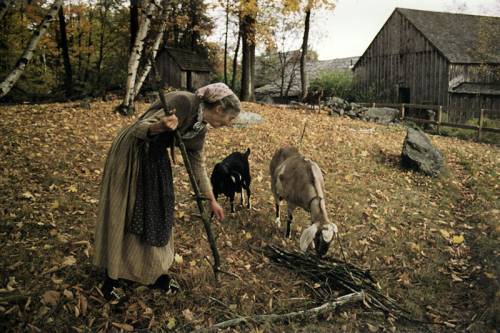 Day 5 | Wednesday, Dec. 29
Day 5 | Wednesday, Dec. 29
Dare to live authentically
Am I now seeking human approval, or God’s approval? Or am I trying to please people? If I were still pleasing people, I would not be a servant of Christ. — Galatians 1:10
Her name was Tasha Tudor. By the dress she wore in the black-and-white photograph of her amid flowers with a Corgi by her side, one would think that the picture was taken in the early 1800s. Except there were no cameras then. Rather, the picture was taken in the 1990s. Tasha, though, was dressed for another century. Tasha, in fact, lived her life in another century.
The prolific children’s book illustrator, who published more than 100 books, followed her passions, creating a world where she embraced the fashions and lifestyles of the 1830s. Her children grew up with their mother’s unique view of life, remembering days full of candlelight and turkeys cooking on a spit over a fire. As Tasha got older, her eldest son built a small home on his Vermont property where she continued to garden and cook, in period clothing, until her death in 2008.
Tasha had a dream, and rather than letting the world tell her dream was impossible, she showed the doubters that all things are possible.
When I returned from my 18th-century, open-hearth cooking adventure, I not only unpacked notes and recipes from my bag. I also unpacked a dormant dream: to live in a time long since forgotten. I shared with my husband my desire to be off the grid. I then asked sweetly, “Can we add a keeping room, without electricity and with an open hearth, to our already old home?”
We have yet to add that primitive living addition to our house, and when it is discussed my husband jokes that I am the only person who wants to spend money “downgrading” our home rather than upgrading it. But I have a dream. I have a passion. And deep in my soul, this is what connects me to the divine. It is where I feel myself come alive to who God created me to be. It is at a rustic old table with a candle lit that I do all this writing.
I wonder, though, how many of us spend our lives pushing aside what will make our souls sing? How many, as they draw their last breath, have regrets that they never dared to lived authentically? Certainly not Tasha Tudor.
In this season of Christmas, when we remember the greatest dream God had for humanity was its salvation in Jesus, could we allow ourselves to be saved, that is, from ourselves, from our negativity, and from all the times we have said or heard, “It can’t be done”?
I have noticed during this time of COVID-19 that more people are waking up from their societal slumbering. They are daring to risk and live a different life, reaching for dreams that are not out of reach if they will only stretch their arms out a bit more in faith.
For years there was a brick factory on the edge of a rural village in upstate New York. It once employed hundreds of workers who produced shirts, but it had been empty for more than 20 years. I was once the pastor in that village, and every time I passed the building, I had a vision of it coming back to life. Just recently, a young couple in Colorado who design furniture has bought it and are now restoring it, creating spaces for their design gallery and residence.
Howard Thurman once said that our dreams are the living water welling up from the very springs of Being, nourishing and sustaining all life. He also said that a “dream is the quiet persistence in the heart that enables a man to ride out the storms of his churning experiences.”
Imagine what the world would be like without the Tasha Tudors in it? Imagine what the world would be like if God wasn’t the biggest dreamer of all?
Pray
Encourager God, you know the dreams we hold in our hearts because you are the one who has placed them there. Forgive us for being afraid of them. Forgive us for thinking the life you want for us is impossible. Give us courage this day to live as the child you created us to be. In Jesus’ name, we pray. Amen.
Taking stock
How can my life better reflect the light of Christ? What do I need to let go of? What do I need to do more of?
 Day 6 | Thursday, Dec. 30
Day 6 | Thursday, Dec. 30
The day-old bread bin
“I was naked and you gave me clothing, I was sick and you took care of me, I was in prison and you visited me.” Then the righteous will answer him, “Lord, when was it that we saw you hungry and gave you food, or thirsty and gave you something to drink? And when was it that we saw you a stranger and welcomed you, or naked and gave you clothing? And when was it that we saw you sick or in prison and visited you?” And the king will answer them, “Truly I tell you, just as you did it to one of the least of these who are members of my family, you did it to me.” — Matthew 25:36–40
I made a quick trip to the grocery store this week, wanting to get a few items for a quiet, yet festive New Year’s Eve dinner for my husband and myself. We are not “noisemakers and champagne people.” Rather, we tend to greet the new year at 5 a.m. on Jan. 1, when our alarm goes off.
As I was whizzing up and down the store aisles, knowing exactly what I wanted and where to find it, I suddenly stopped. I found myself in front of a big bin of day-old bread. The many different loaves, from cinnamon swirl to sourdough, were tossed together. Their plastic bags now marked with a neon sticker that read: “50% off.” I went to rummage through the loaves but stopped midair. For a moment, I was transported back to a time when the day-old bread bin was the first and only stop I would make at the grocery store.
I was in my 20s, renting a Manhattan studio apartment that took a huge bite out of my assistant editor’s paycheck each month. I was good at budgeting and able to make ends meet, but I didn’t leave too much money in the line item marked “groceries.” There were weekends when I would cross the Hudson River back to my parent’s New Jersey home to visit them — and swipe a roll of toilet tissue, some paper towels and a big bag of apples. And when I entered the city supermarket, I knew better than to linger around all the delicious, expensive premade meals — containers filled with steaming brisket or baked chicken — with their scents wafting through the air making my mouth water. No. I would make a beeline to the day-old bread bin and find what looked the most appealing and the freshest.
I lived like that for a while, even after many small raises boosted my budget for groceries. I just couldn’t get out of the habit of only placing in my shopping cart items that were marked down in price.
I no longer live like that. I now have the comfort of being able to buy fresh, artisan bread. I even have the means to splurge on pricier items. But occasionally, when my husband asks if I want to grill a steak, I can’t help but cringe when I see the prices of the slabs of meat he puts into the cart. I have also pointed out to him the cheaper cuts that he could have chosen.
Occasionally, I find myself stopping in front of the bin of day-old bread with my husband and asking, “What are you doing?” I am remembering a time when this bin was my saving grace. I am remembering the days where I had to watch every penny I had. I am remembering both the days of want and the days of plenty.
But mostly now, when my hand does reach into the day-old bread bin, it is more of a priestly act — a blessing of sorts. For when I gingerly touch the bags, I remember that there are still those who enter grocery stores across the country and make a beeline for the day-old bread bins. I think back to when I was one of them.
“There is a unity that binds all living things into a single whole,” said Howard Thurman. May the unity that binds us this Christmastide be a compassion for those whose hands reach for day-old bread. May the unity that binds us in the new year be one in which we work together toward the day when day-old bread bins are no longer needed.
Pray
Gracious God, in this season full of holiday foods, help us to remember that not everyone has a feast to enjoy. Help us to become more aware of the growing number of families in our communities who are struggling to put food on the table. Open our eyes to see who might be reaching into the day-old bread bin, and then lead us to ways we can feed your children. In Jesus’ name, we pray. Amen.
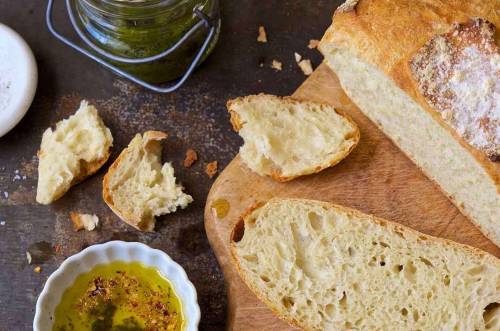 Taking stock
Taking stock
How can my life better reflect the light of Christ? What do I need to let go of? What do I need to do more of?
No-Knead Crusty White Bread
Here’s an easy, no-knead bread recipe that yields three to four loaves, depending on size, that are perfect for wrapping up and sharing with others to ring in the New Year. Go to: kingarthurbaking.com/recipes/no-knead-crusty-white-bread-recipe
 Day 7 | Friday, Dec. 31
Day 7 | Friday, Dec. 31
Making a path
Trust in the Lord with all your heart, and do not rely on your own insight. In all your ways acknowledge him, and he will make straight your paths. — Proverbs 3:5–6
With all the snow that had fallen, I just had to go sliding down the hill behind my house in Vermont. So, in the bitter cold, I put on my boots, hat and gloves and dug out the snow saucer from the cellar. I didn’t know what I was in for. It sounded like a lot of fun at first.
I began my trek up the hill. The snow-covered mountains provided a sharp contrast to the deep blue sky. Once I was at the top, I noticed there was nothing but silence all around. I placed the saucer on the ground, sat on it and pushed myself forward. It didn’t budge. I pushed again. Still no movement. I found myself sitting on this saucer slowly inching my way down the hill as to cut a path into the deep snow. I never had to cut a path in the snow before. As a child, the hills were always sled ready.
After a grueling trip down the hill, I decided to try my path out. Up the hill I went again. I sat down on the saucer and pushed forward. Slowly I went down, getting stuck every few feet. I got to the bottom and looked up the hill, hearing a voice inside whisper, “Come on, one more time.” My legs were frozen numb. My arms were sore. But up the hill I went. I sat down on the saucer for a third time, not expecting much and pushed forward. That’s when it happened. I was flying down the hill! The snow was packed enough to provide a slick path for me.
After that great run, I called it a day. With a cup of cocoa in my hand and some leftover Christmas stollen, I couldn’t help but think how it takes perseverance to achieve the things we want to achieve, and yet how quickly we often give up when things don’t go smoothly. I see this with our children when doing crafts at the church: how often little fingers will give up and hand the project over to an adult to finish for them. I look over at the bread dough, remembering a time when I gave up on making bread all because I kept failing at getting the yeast to rise. And what about our relationship with God?
Soon the warmth of the nativity story will cool. Life will be filled with the mundane. Life’s busyness will edge out this time of daily devotions. How quickly will we give up trying to clear a smooth path toward a deeper relationship with God?
2021 is quickly ticking away and a new year will be upon us. It’s a time of making resolutions that we probably won’t keep. But I pray that today, you don’t make a resolution.
Rather, I pray that you will recommit to making time for God. Climb whatever snowy hill you must climb to get to the divine. Work on clearing a path to God’s word. And don’t give up if it seems arduous. Keep at it because anything worthwhile takes work. And God is worth your while. Here’s to a blessed 2022!
Pray
God, you who make all things new, as the calendar turns a page and ushers in a new year, help us to continue making you a priority in our lives. May we find those blessed moments in our day to just sit quietly with you. May we find ourselves praying more, trusting more and calling upon your holy name more today and in the days to come. In Jesus’ name, we pray. Amen.
Taking stock
How can my life better reflect the light of Christ? What do I need to let go of? What do I need to do more of?
 Day 8 | Saturday, Jan. 1 (New Year’s Day)
Day 8 | Saturday, Jan. 1 (New Year’s Day)
Have a blessed day
Do not remember the former things, or consider the things of old. I am about to do a new thing; now it springs forth, do you not perceive it? I will make a way in the wilderness and rivers in the desert. — Isaiah 43:18–19
There was a man at a church in New Jersey where I once worked who would never say goodbye to me. Instead, he would say, “Have a blessed day!” Admittedly, I was a bit surprised the first time I heard it. No one says that when they are leaving — especially in church. So the first time it happened, I thanked him and said, “You too!”
What really surprised me was the power those words had on me. “Have a blessed day” says so much more than “goodbye” can ever say. In just a few seconds, “Have a blessed day” reminds you that the time you have is indeed blessed and to take time as you go about your day to realize how blessed each moment is and can be. “Have a blessed day” makes you feel that someone really noticed you and took time to see the child of God that you are.
“Have a blessed day” rather than “goodbye” wakes you up to the fact that God’s divine grace and beauty are embedded in all of life, and it is our responsibility to open our eyes to the divine that is there in the mundane. We go through the motions of making small talk with others, but rarely do we invest our time in seeing the light of Christ in another. Rarely do we dare to enter more deeply into another person’s life.
Howard Thurman believed that the new year is our opportunity to look at one’s life objectively, to even “select one thing beyond the needs of you and your family with which to be concerned with.”
Many churches within the Presbyterian Church (U.S.A.) are committing to becoming Matthew 25 congregations — communities of faith that take to heart Jesus’ words to help “the least of these.” While the three areas churches are invited to focus on include addressing hunger issues, dismantling racism and seeking to become more vital within their communities, I can’t help but pose the following question: What if the work of Matthew 25 really began from within each of our hearts and began with the words we choose to use?
Words are powerful, and they can make a difference. I remember reading last summer a newspaper article about all the phrases that are used among theater folks, many of which are sexist and racist. What if we chose to begin this new year more mindful of only speaking words of grace, words of healing and words of love? What if we tried not to say anything negative and complied with the adage that if you don’t have anything good to say, don’t say anything at all? What if it were possible that saying, “Have a blessed day!” could do more in the world than a simple “goodbye”? What if?
Pray
God, let the mediation of my heart and the words of my mouth, be pleasing to you and to all who hear me. In Jesus’ name, I pray. Amen.
Taking stock
How can my life better reflect the light of Christ? What do I need to let go of? What do I need to do more of?
A quick reminder
January is here, but we are still in the season of Christmastide. Are you still taking time each day to light the Christ candle that was part of your Advent wreath? This focus on light will become even more important as we make our way to Epiphany and remember the bright star that led the Magi to the Babe of Bethlehem.
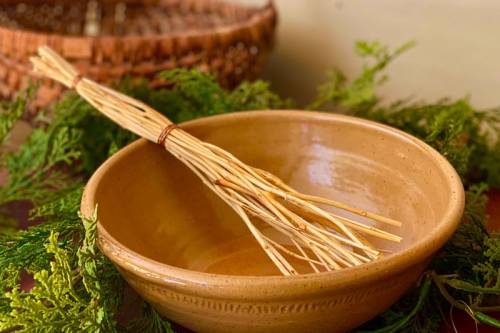 Day 9 | Sunday, Jan. 2
Day 9 | Sunday, Jan. 2
A twig whisk
But since we belong to the day, let us be sober, and put on the breastplate of faith and love, and for a helmet the hope of salvation. For God has destined us not for wrath but for obtaining salvation through our Lord Jesus Christ, who died for us, so that whether we are awake or asleep we may live with him. Therefore encourage one another and build up each other, as indeed you are doing. — 1 Thessalonians 5:8–11
“You want me to use WHAT to mix the batter?” I didn’t mean for my question to sound so incredulous, but the cooking instructor stood there with what looked like a bunch of twigs tied together in his hand, insisting that this was indeed a real kitchen utensil. I had wanted to master primitive cooking skills, but using twigs — for a whisk?
Turns out, the birch twig whisk, as it is officially called, was better than any metal whisk I have ever used. The wispy ends of the twigs reached more of the batter along the sides of the bowl and got deep into the little corners of flour that always form when trying to mix dry ingredients with wet. And so there I and my cooking classmates were, taking turns whisking the batter with a strange little utensil. We whisked away till our arms grew tired and then passed the bowl of batter along to the next person to take over.
For the cake we were making to be light and fluffy, the batter had to have a lot of air in it. There was no other means of leavening except for the manual whipping, whipping and whipping of the batter. As we took turns passing the bowl and the twig whisk around, our instructor insured us that this cake would be worth our sore arms. He also warned that this was a recipe not to be made alone: “You need a community gathered around you to step in and continue the mixing when you grow tired.”
I looked down at the twigs in my hand as I continued to stir and thought, “Life is sweeter when you have a community there to help you.” Each twig on its own wouldn’t be able to mix the batter. But twigs tied together are much stronger for the task.
Howard Thurman echoed the wisdom of John Donne, who wrote, “No man is an island,” when he said, “It is of crucial importance for each person to consider how he relates to himself, to the society in which he is a part. We are not an island; we do not live alone.”
The instructor was right. The cake was worth our sore arms, but I think it was the many hands passing the bowl and twig whisk around that made it so delicious. And I am proud to say, I now have a twig whisk in my kitchen drawer.
Pray
God, help us this day to value the importance of community in our lives. We are not meant to journey alone. There is strength in working together, especially as we work for justice for those who are suffering and neglected. In Jesus’ name, we pray. Amen.
Taking stock
How can my life better reflect the light of Christ? What do I need to let go of? What do I need to do more of?
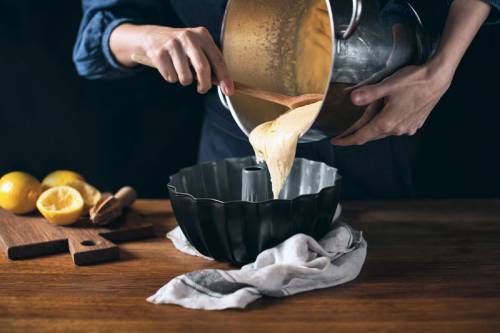 Day 10 | Monday, Jan. 3
Day 10 | Monday, Jan. 3
Stirring up our faith
Therefore I remind you to stir up the gift of God which is in you through the laying on of my hands. For God has not given us a spirit of fear, but of power and of love and of a sound mind. — 2 Timothy 1:6–7 (New King James Version)
On my bookshelf sits an Anglican “Book of Common Prayer.” I inherited it during my days, ever so short, that I was serving as a Christian education director in an Episcopal church. For a time, I thought about pursuing an Anglican ordination, but in the end, the Presbyterians wooed me over.
I still enjoy, though, reading from the “Book of Common Prayer.” I am especially fond of the liturgy for the Sunday before the start of Advent, which is known as “Stir Up Sunday.” It gets its name from the prayer of the day that reads, “Stir up, we beseech thee, O Lord, the wills of thy faithful people; that they, plenteously bringing forth the fruit of good works, may of thee be plenteously rewarded; through Jesus Christ our Lord. Amen.”
It is a day that has traditionally become the day to literally stir things up, with the faithful getting to work at making holiday fruitcakes. A friend of mine, who is an Episcopalian priest, considers Stir Up Sunday an important day on the calendar. He observes it with the same reverence of celebrating the Eucharist. He clears his schedule and sets to work in the kitchen, “stirring up” all the dried fruits and nuts into a batter that will cook until golden. Once cooled, the cakes are stored in a tin throughout Advent and Christmastide, soaking up the brandy drizzled on then daily. Come the eve of Epiphany, also known as “Twelfth Night,” my friend makes the rounds delivering the cakes. I am lucky to be on his fruitcake list. (That sentence can be read many ways!)
As the season of Christmastide draws to a close, I find myself making my own fruited cake. I had become interested in several recipes after learning that these cakes were in fact the original wedding cakes of old. There were no white fondant cakes with sugar flowers for the bride and groom to cut into. What they sliced and shared was a heavy, boozy and fruit-laden creation.
Some staunch Stir Up Sunday observers like my friend might tell me that I am too late in the season to be baking, but I don’t care. I like being reminded, as the holidays come to an end, that the faithful need to have their wills for serving God “stirred up” a bit every day.
Pray
God, stir up our faith today. Stir up our desire to speak boldly for those who have been wronged. Stir us up to work for justice. “Stir us up” is our prayer, so that our lives become beautiful gifts to the world. In Jesus’ name, we pray. Amen.
 Taking stock
Taking stock
How can my life better reflect the light of Christ? What do I need to let go of? What do I need to do more of?
Everyone’s Favorite Fruitcake
Not everyone likes fruitcake. In fact, fruitcake has been the brunt of many a holiday joke. But this recipe lives up to its name. I invite you to join me in “stirring up” the faith for the new year to come. Make a few loaves and give them as gifts later in the month. It might be a great way to remind people that the light of Christ is indeed shining brightly in the world. Go to: kingarthurbaking.com/recipes/everyones-favorite-fruitcake-recipe
 Day 11 | Tuesday, Jan. 4
Day 11 | Tuesday, Jan. 4
Bringing good tidings
How beautiful upon the mountains are the feet of the messenger who announces peace,
who brings good news, who announces salvation, who says to Zion, “Your God reigns.” Listen! Your sentinels lift up their voices, together they sing for joy; for in plain sight they see the return of the Lord to Zion. Break forth together into singing you ruins of Jerusalem; for the Lord has comforted his people, he has redeemed Jerusalem. The Lord has bared his holy arm before the eyes of all the nations; and all the ends of the earth shall see the salvation of our God. — Isaiah 52:7–10
I still have Christmas music playing in my home. Among the selections filling my office is “How Beautiful are the Feet” from Handel’s “Messiah,” which lifts the verse from Isaiah that proclaims, “How beautiful upon the mountains are the feet of those who bring good news, who proclaim peace, who bring good tidings, who say to Zion, ‘Your God reigns.’”
On New Year’s Day, my husband and I put on our snowshoes and went out among the hills that are beyond our property. We couldn’t think of a better way to begin a new year than together out in God’s creation. As we made our way up and down the many slopes and around pine trees, we turned a bend and there we stood before the most amazing view of Vermont’s Green Mountains. The mountains looked as if a pastry chef had dusted them with confectioners’ sugar. I wondered then how anyone could not trust God’s goodness in their life.
I thought of Isaiah’s words. The mountains were majestic, but they were made even more so by the beauty of those who walked upon them — those bringing good news to the created world around. I thought about how it is that beauty begets more beauty. When one seeks to bring good tidings into every place they enter, doesn’t the beauty of God, which is there all along, finally become apparent? Whereas the one who thrives on bad news or relishes in negativity often darkens the mood of a room. How beautiful are the feet that dare to tread where the ugliness of hate resides? How beautiful would this world be, if your feet carried you into places this year that needed to hear good tidings?
Pray
Merciful God, the angels’ song of good tidings is getting softer as we step into the new year, but that is OK. We know the words. We have been lifted by the tune. We know the Good News that needs to be shared by us. And so, God, guide our feet this day to where you want us to be and who needs to hear tidings of peace, joy and love. In Jesus’ name, we pray. Amen.
Taking stock
How can my life better reflect the light of Christ? What do I need to let go of? What do I need to do more of?
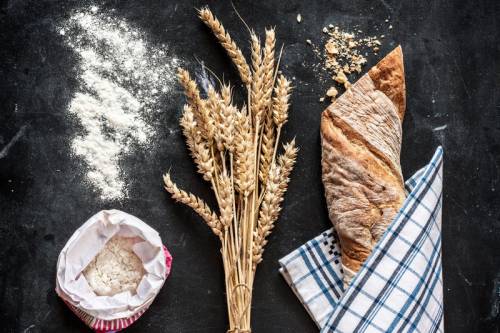 Day 12 | Wednesday, Jan. 5
Day 12 | Wednesday, Jan. 5
Hope never dies
Then Jesus said to them, “Very truly, I tell you, it was not Moses who gave you the bread from heaven, but it is my Father who gives you the true bread from heaven. For the bread of God is that which comes down from heaven and gives life to the world.” They said to him, “Sir, give us this bread always.” Jesus said to them, “I am the bread of life. Whoever comes to me will never be hungry, and whoever believes in me will never be thirsty.” — John 6:32–35
It’s a Twelfth Night tradition for me to go to the Scottish specialty store a few towns over from where I live to buy a “Scotch bun” — a type of fruitcake that is wrapped completely in flaky pastry crust. While for centuries the Scotch bun was served on this day that marks the end of the Christmas season, it has become more popular to serve it on New Year’s Eve. It is true, not many people I know celebrate Twelfth Night, let alone realize that it is an actual holiday and not just a Shakespearean play.
As I pulled up to the store, I was relieved to see it was still open for business. Prior to COVID-19, the owners shared with me that business had been slow. I could only imagine the financial stress that the pandemic added to nonessential retailers like the little Scottish shop. I walked in and saw that while the shelves weren’t as full as the once were, there was still a small offering of Scotch buns available. As I caught up with the owners, I shared how happy I was to see they were still in business. They admitted it was tough, but they were able to reinvent themselves quickly, focusing on baked goods and groceries, which meant they were now “essential” retailers. “What really saved us was the bread I began baking,” said the wife with the Scottish brogue I had missed hearing. The bread business had become so popular that it is now part of the day-to-day offerings of the shop.
When Jesus said to those who were worried about their tomorrows that he was the “bread of life,” who would have thought that statement would carry so much truth. This couple’s business was able to survive a global pandemic thanks to the baking of bread for others.
Currently, there are many farms in my area that are also being given hope for tomorrow as local artisan bread makers. They are popping up throughout the state and partnering with farmers to supply them with grain. One such upstart bread company has expanded its operations, building a mill to grind the grain from local farms.
In a year of so many losses due to a virus that still has a tight grip on us, I find joy in these stories of how new life is emerging from death. I take these seemingly little wins — a couple able to keep their retail shop afloat thanks to the baking of bread, and bread makers finding a way to support local farms by using their grain — and thank God, not just because I really wanted a Scotch bun for my Twelfth Night table, but because Jesus’ words — “I am the bread of life” — have never been more powerful or tangible to me than now.
Pray
Redeemer and Sustainer, on this Epiphany eve, we lift our hands in praise to you for all that you have done this past year and all that you continue doing in our lives. For those times when you rescued us and gave us new hope, we thank you. For those times that you walked with us through the shadowy valley of death, we thank you. For those times you have breathed new life into our weak and fainting bodies, we thank you. May we remember that with you, O God, all is not lost. May we remember with you, O God, all will indeed be well. In Jesus’ name, we pray. Amen.
Taking stock
How can my life better reflect the light of Christ? What do I need to let go of? What do I need to do more of?
Epiphany Is Here
The Sacrament of Christmas
By Howard Thurman

Howard Thurman From the Howard Thurman and Sue Bailey Thurman Collections, Howard Gotlieb Archival Research Center at Boston University
I make an act of faith toward all humankind,
Where doubts would linger and suspicions brood.
I make an act of joy toward all sad hearts,
Where laughter pales and tears abound.
I make an act of strength toward feeble things,
Where life grows dim and death draws near.
I make an act of trust toward all life,
Where fears preside and distrusts keep watch.
I make an act of love toward friend and foe,
Where trust is weak and hate burns bright.
I make a deed to God of all my days —
And look out on life with quiet eyes.
Reflect
Our time together has come to an end, but the work of being the hands and feet of Christ in the world continues. As we reflect on the last couplet of Howard Thurman’s “The Sacrament of Christmas,” think about what new things you learned during Advent and Christmastide. What excited you? What made you pause? What troubled you? And how will you look out on life with quiet, expectant eyes? May you challenge yourself in the days and weeks to come, to see Christ in all things. As the “Prayer of St. Patrick” says, may you see, “Christ in my sleeping, Christ in my sitting, Christ in my rising, light of my life.”
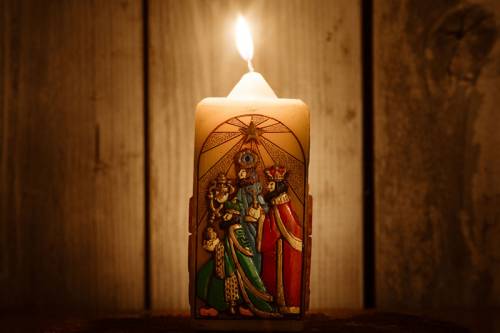 Thursday, Epiphany, Jan. 6
Thursday, Epiphany, Jan. 6
Our Epiphany moments
For once you were darkness, but now in the Lord you are light. Live as children of light. — Ephesians 5:8
I look around my seemingly bare living room this morning and let out a long sigh. “I know. It doesn’t look the same, now that the Christmas lights are gone,” I say to my cat, Reverend, who doesn’t even try to fain interest.
The Christmas season is over, and Epiphany — a Greek word which means “manifestation” — has come. It’s on this day that we celebrate the visit of the Magi to Jesus and are reminded that those who truly recognized Jesus as the King of Kings were outsiders, thus, emphasizing once again the mission statement of Jesus, who said himself, “The Son of Man came to seek and save the lost.” That means all who are lost, not just a select few.
We are asked to see the Light of the world that no darkness shall overcome, even when all our artificial “lights of the world” are gone. But when all the Christmas decorations are packed away, we tend to stow with them the promises of Christmas: the promise of a Savior who hears our cries, the promise of a Friend always by our side, the promise of a tear catcher, secret keeper, dream sharer, nightmare chaser and hug giver, always close by in our lives.
If the promise and hope of Christmas had the ability to light up our lives, leading us to be kinder to one another for just a few short weeks, then the realization of the Word made flesh should continue leading us onward to be kinder, gentler and more giving to one another.
If Advent has been our time to watch and wait for God’s gift, and Christmas our season to go and adore that gift, then Epiphany is our time to come and see Christ in our lives now. There are still more loaves to be baked and shared. There is still more bread to be broken with friend and foe.
The Magi might have had the advantage of following a bright star, but we don’t need a light in the sky to reveal Christ to us. We don’t need to search high and low for our epiphany moments. All we need to do is commit to being fully present to God each day. For when we are, we will begin seeing as God sees. We will finally see the radiance of the Christ light that has never stopped shining.
Pray
God of wonder, God of light, keep shining upon us as we seek to serve the lost, the lonely, the broken and the misunderstood. In Jesus’ name, we pray. Amen.
 Three Kings’ Bread
Three Kings’ Bread
While living in Manhattan, a Spanish friend of mine invited me to a Three Kings’ Day celebration at her church. It was day of gift-giving and remembering how the Magi presented their gifts to Jesus. The centerpiece of the celebration, though, was found on the buffet table — what she called “Three Kings’ Bread” (or cake). Inside the bread, a figurine of a baby representing Baby Jesus was hidden. The custom is that whoever gets the doll must give a party on Candlemas (Feb. 2). Three Kings’ Day celebrations, while a tradition in Latin communities, is growing in many non-Hispanic Presbyterian churches. Why not start a new tradition in your family this year and host a Three Kings’ Day party? Here’s a recipe for Three Kings’ Bread. Go to: kingarthurbaking.com/recipes/three-kings-cake-rosca-de-reyes-recipe

